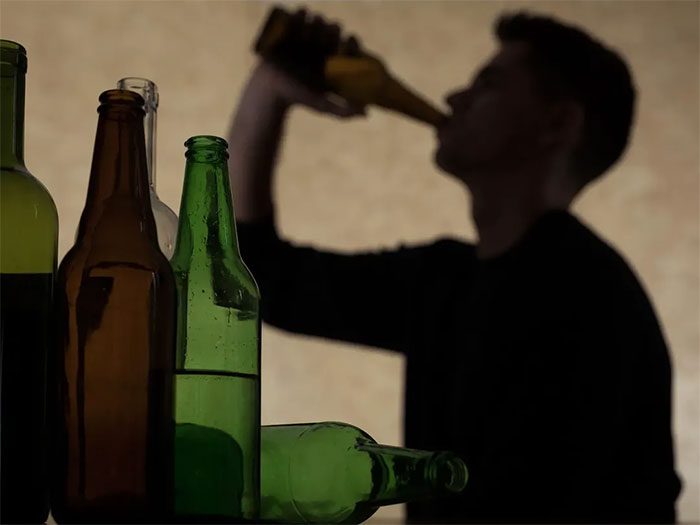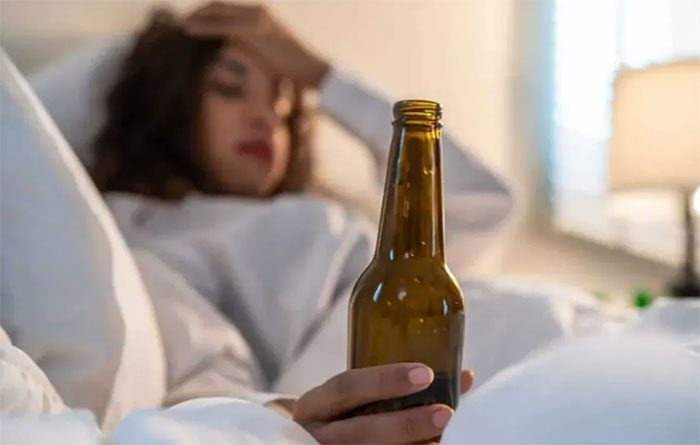Many people often say that having a drink before bed can help you sleep better if you’re having trouble falling asleep. It sounds reasonable since alcohol is a depressant that can somewhat “numb” your nervous system. However, there’s a truth you may not know: while alcohol can make you feel sleepy faster, the trade-off is that you will likely experience a night of poor sleep.
In fact, alcohol can never improve sleep quality. While it may help some people fall asleep more easily, three to four hours after falling asleep, individuals often wake up and find it difficult to return to sleep.
If you’re struggling to fall asleep, consider other relaxation methods instead of having a drink.
Alcohol is a depressant to the central nervous system, which is why it gives you a temporary feeling of comfort and relaxation, and many people doze off after drinking. Understanding how alcohol affects sleep is not straightforward. It’s not just about drinking heavily or being intoxicated; even one drink close to bedtime can have significant effects on your sleep.

Alcohol reduces sleep quality.
1. Alcohol Disrupts REM Sleep
The “relaxing” property of alcohol makes it seem like a popular choice for some to help them fall asleep at night. However, it actually reduces sleep quality. Numerous studies indicate that drinking alcohol disrupts your sleep cycles, particularly REM sleep (Rapid Eye Movement sleep). Remember, REM sleep is when dreams occur.
Evidence shows that deeper sleep while drinking alcohol is also linked to increased alpha waves in the frontal lobe, indicating a state of wakefulness rather than deep sleep. Therefore, while you may initially fall asleep faster, you will not achieve quality REM sleep. When you don’t get enough REM sleep, you won’t feel rested, which affects your work performance and other daily activities the next day.
2. Frequent Wake-ups in the Middle of the Night
When you drink alcohol, the stimulating nerve cells in your brain are suppressed, allowing you to drift off to sleep. However, this sleep will not last for most people. As your body metabolizes the alcohol, the stimulating nerves recover, causing you to wake up and making it very difficult to fall back asleep.
This side effect happens to me almost every time I drink in the evening. Imagine you’ve had a drink before bed, and you wake up at 2 AM, staring into the darkness, wishing you hadn’t drunk alcohol.

When you drink alcohol, you are essentially disrupting your sleep-wake cycle.
3. Alcohol Suppresses Melatonin Production in the Body
The human body produces melatonin to help regulate our sleep-wake cycles, which align with the sunlight cycle. The pineal gland releases melatonin when the sun sets, and we start to feel tired. When you drink alcohol, you are essentially disrupting your sleep-wake cycle.
This is why drinking alcohol reduces melatonin production—regardless of whether the sun has set. One study found that drinking alcohol one hour before sleep can inhibit melatonin production by up to 20%. Many people wonder if they can supplement melatonin to counteract the side effects. The reality is that mixing alcohol with melatonin can lead to potential side effects such as anxiety, high blood pressure, dizziness, or respiratory issues, and it may even affect the liver’s ability to produce certain enzymes.
4. Exacerbates Sleep Disorders
If you are living with obstructive sleep apnea, where the throat and tongue muscles obstruct your airway, alcohol makes the situation worse. When you drink alcohol before bed and have sleep apnea, the throat muscles relax and collapse more frequently, leading to longer periods of interrupted breathing.
Many studies also show that drinking alcohol increases the risk of sleep apnea by 25%, as it can contribute to lower oxygen saturation levels in patients with obstructive sleep apnea.
Alcohol also worsens insomnia, the most common sleep disorder, characterized by difficulty falling asleep, waking throughout the night, or rising too early in the morning.
Experts estimate that 35% to 70% of people who drink alcohol also struggle with insomnia. This situation is likened to the chicken-and-egg scenario: insomnia issues can worsen with alcohol consumption, and insomnia can also contribute to someone’s alcohol dependence.

Alcohol also exacerbates insomnia, the most common sleep disorder.
If you want to enjoy your favorite drink while still aiming for a good night’s sleep, consider the following tips.
1. Be Aware of How Alcohol Affects Your Sleep
This emphasizes that you should be aware of how alcohol impacts you and your sleep schedule. Try keeping a sleep diary to track the duration and quality of your sleep, and include the amount and timing of alcohol consumed to observe any changes related to sleep quality.
Alcohol often has different effects on different individuals. By understanding these differences, you can set limits based on your body and needs.
2. Stop Drinking at Least Four Hours Before You Sleep
You can still enjoy a glass of wine, but try to have it about four hours before your bedtime and drink in moderation. Four hours is a good standard as it gives your body time to metabolize the alcohol, ensuring it doesn’t impact your sleep.

















































